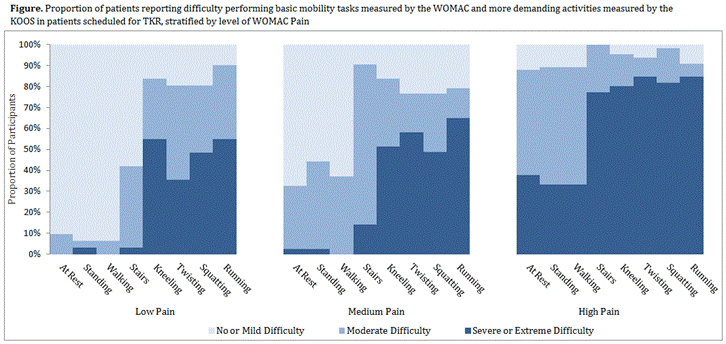Session Information
Date: Sunday, November 8, 2015
Title: Osteoarthritis - Clinical Aspects Poster I: Treatments and Metabolic Risk Factors
Session Type: ACR Poster Session A
Session Time: 9:00AM-11:00AM
Background/Purpose: Historically, persons with knee OA considered for total knee replacement (TKR) have had severe pain, as reflected in high WOMAC scores, in addition to extensive structural changes and limited mobility. The WOMAC Pain scale captures basic mobility domains, including pain at rest (sitting or lying down), standing, walking, and using stairs. More recently, patients undergoing TKR have had lower WOMAC Pain scores, raising questions about the appropriateness of TKR in these patients. We hypothesized that pain in TKR patients with low WOMAC pain scores is provoked by more demanding activities such as kneeling, twisting, and squatting. Difficulty with these activities may compromise their quality of life and lead to TKR. We sought to evaluate the degree of difficulty with more rigorous recreational activities in persons undergoing TKR with low, medium, and high levels of WOMAC Pain.
Methods: We used baseline data from the Study of Physical Activity Rewards after Knee Surgery (SPARKS). Participants completed baseline questionnaires within 8 weeks prior to TKR, which included the WOMAC Pain and Knee Injury and Osteoarthritis Outcomes Score (KOOS) Sports and Recreational Activity scales. We stratified subjects into three groups according to WOMAC Pain scores (0–100, 100 worst): Low (<25), Medium (26–40), and High (>40). Within each pain group we assessed the difficulty subjects reported with going up and down stairs, twisting or pivoting, kneeling, squatting, and running.
Results: The sample consisted of 140 persons scheduled to undergo TKR, with an average age of 66 (SD 8) years. The mean WOMAC Pain score was 42 (SD 20). 22% of study participants were in the Low Pain group, 31% in the Medium Pain group, and 47% in the High Pain group. Those with lower WOMAC Pain scores tended to be older: mean age 68 years for those in Low Pain compared to 63 years for those in High Pain. 42% of patients in the Low Pain group reported at least moderate pain using stairs, compared to 91% and 100% of those in the Medium and High Pain groups (Figure). About half of patients in the Low Pain group reported severe or extreme difficulty with squatting, kneeling, or running, while an additional 30% reported moderate difficulty with those same tasks.
Conclusion: Persons with low or medium WOMAC Pain undergoing TKR seldom report pain with basic mobility yet frequently report substantial difficulty with more demanding daily activities, such as using stairs, kneeling, and squatting. TKR is likely to allow these patients to regain the ability to perform these activities that are fundamental to their quality of life. Determining the effectiveness of TKR based on improvements in WOMAC Pain may be limited in patients with low preoperative WOMAC pain scores. Assessment of TKR effectiveness should consider improvement in the ability to perform more demanding but important daily activities such as kneeling, squatting and using stairs.
To cite this abstract in AMA style:
Usiskin IM, Yang HY, Deshpande BR, Collins JE, Michl GL, Smith SR, Klara KM, Katz JN, Losina E. Activity Limitations in Persons with Low, Medium, and High Levels of Pain Prior to Total Knee Replacement: Implications for Appropriateness and Efficacy [abstract]. Arthritis Rheumatol. 2015; 67 (suppl 10). https://acrabstracts.org/abstract/activity-limitations-in-persons-with-low-medium-and-high-levels-of-pain-prior-to-total-knee-replacement-implications-for-appropriateness-and-efficacy/. Accessed .« Back to 2015 ACR/ARHP Annual Meeting
ACR Meeting Abstracts - https://acrabstracts.org/abstract/activity-limitations-in-persons-with-low-medium-and-high-levels-of-pain-prior-to-total-knee-replacement-implications-for-appropriateness-and-efficacy/

